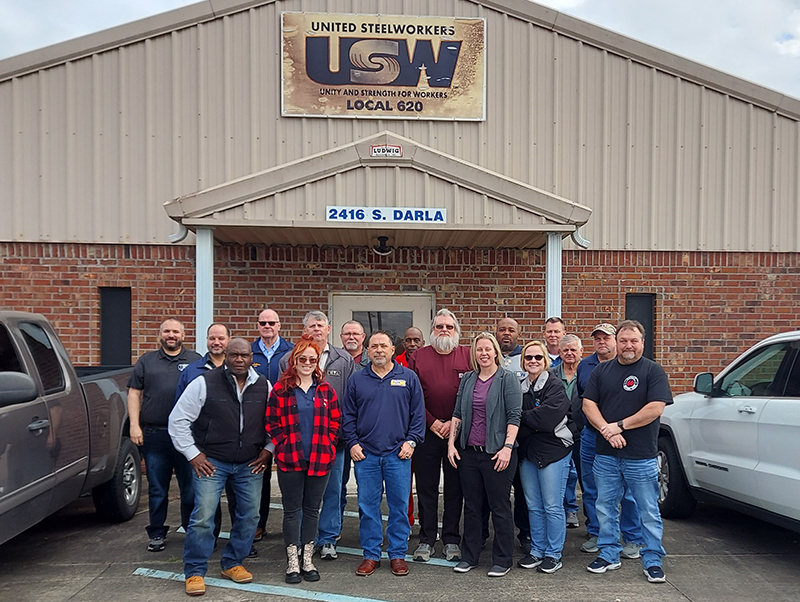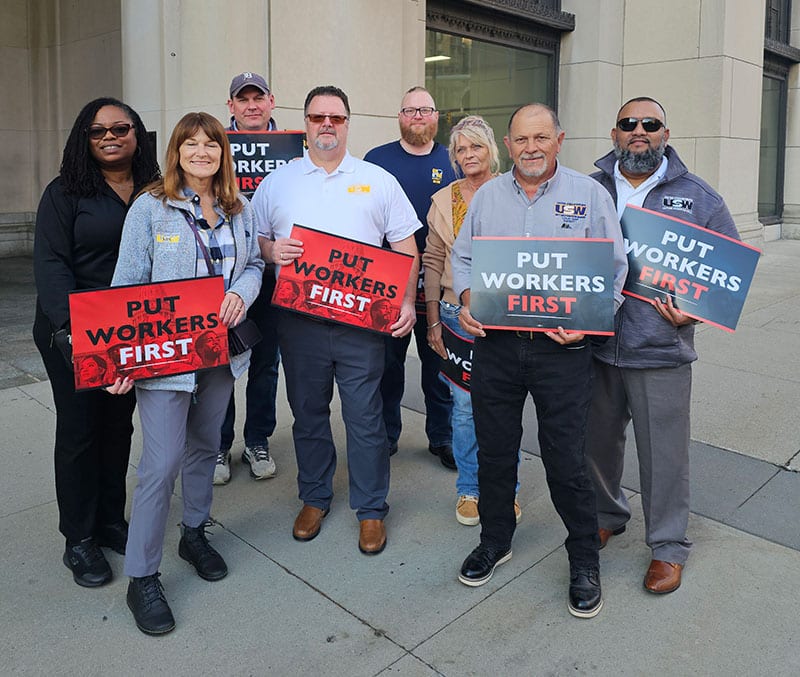BASF Council members tackle chemical sector health and safety in Louisiana
Members of the USW BASF Council used their first in-person gathering since the COVID-19 pandemic—held Jan. 24-25 in Gonzales, La.—to build collective strength and learn from each other’s experiences in the diverse chemical sector.
The meeting, hosted by Local 620, was coordinated by District 13 Director Larry Burchfield, who led the group through two days of fruitful discussions on health and safety, staffing, fatigue, and organizing.

“I look forward to working with this council and working through our common issues to tackle this company collectively,” Burchfield told the group on Jan. 24.
BASF is a European multinational chemical company and the world’s largest chemical producer. The BASF group operates in more than 80 countries and owns multiple sites across the United States where USW members work, including Pennsylvania, Michigan, Louisiana, Alabama, and Georgia.
The first topic the council discussed was the macroeconomic environment of the chemical sector as the war in Ukraine and inflation led to higher energy costs across Europe, revealing the interconnectedness of the global industry.
Promoting training
Mike Duffy of the USW Health, Safety and Environment Department also talked with the council on the first day about occupational fatalities and injuries. Mobile equipment accidents remain the primary cause of injuries across industries, shedding light on the necessity for modernized equipment and constant vigilance.
Members engaged in a lively discussion about the urgent need for better training to prevent injuries and fatalities, as well as bridging the generational gap as younger workers enter the field.
“We’ve got a lot of new workers and there isn’t proper training for them,” said Unit President Winston Waite of Local 9-562 in McIntosh, Ala. “They’re just thrown to the wolves. I’ve spoken up about that in our workplace because there’s a lot of ‘green-on-green.’”
USW International Secretary-Treasurer John Shinn, who attended the BASF Council meeting, also touched on the need for a sharper focus on health and safety via contract language and joint union-management Health, Safety and Environment committees.
“We need to take action,” said Shinn. “We know how devastating an accident can be in a chemical facility.”
Model language
Shinn informed the group that the International union plans to roll out model safety and health language to make sure every local union in the sector—which include more than 350 units—puts this issue on the table with their employers.
On the second day of the meeting, the council was able to review the proposed language and give feedback on the best way to implement it across sites with the aid of USW staff representatives. Members of other councils and chemical sector sites will also have the chance to make suggestions and express concerns about this model language in future meetings.
Kelvin Bouie, who serves as president of Local 170-01 in Attapulgus, Ga., said that in order for workers to be truly safe, all parties have to be on the same page. This is particularly relevant when it comes to Stop Work Authority (SWA), workers’ right to stop unsafe work and processes until the potential hazard is thoroughly investigated and abated.
“Everyone has to know exactly what they need to do,” said Bouie. “The education part is going to be very important.”
Shinn acknowledged that changing the already established health and safety culture in many workplaces will not be easy but that it’s vital for the union to work together.
“This is sending a message to the sector and to our employers that we’re serious about safety and health,” Shinn said. “We have a responsibility to our members to make sure that they get home safely.”
Director Burchfield returned to the importance of workers tapping into their strength as activists to create sustainable positive change as the industry and economy evolve.
“Our power in bargaining has always been in the mobilization of our members,” Burchfield said. “We need to make a commitment and follow that commitment. That’s how we’ll get to where we need to be in this sector.”
By clicking Sign Up you're confirming that you agree with our Terms and Conditions.
Recent News Articles
Want to Learn More?
See how the USW is making a real difference in our communities and our workplaces.

